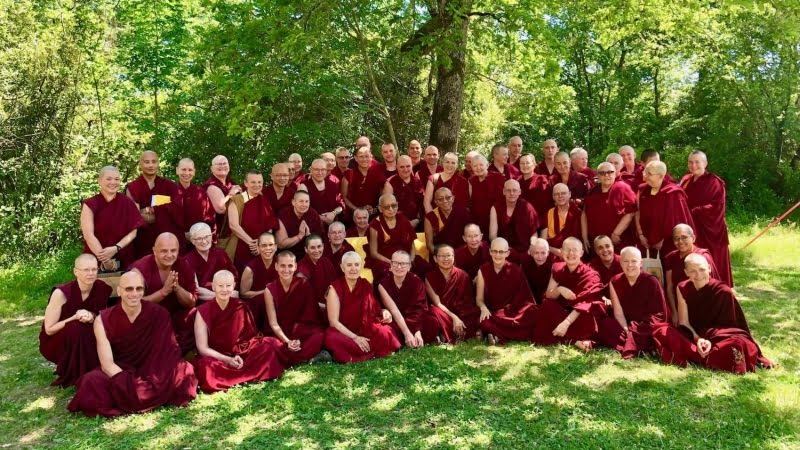Chokhor Duchen, one of four annual holy days marking important events in the life of Shakyamuni Buddha, takes place this year on 21 July.
On Chokhor Duchen we celebrate the Buddha’s first teaching, also known as the first turning of the Dharma Wheel. It’s also International Sangha Day, when the FPMT family celebrates the community of monks and nuns who have chosen a life in ordination as their spiritual path, for the benefit of others.
Meaning of Sangha
“Sangha” is a Sanskrit term meaning “community”, and refers to the spiritual community of monks and nuns. In addition to the monastic sangha, in the West, the term sangha has also become common parlance for a community of practitioners who come together to support each other in their spiritual journeys.
The Sangha is also considered one of the three jewels, along with the Buddha and the Dharma (the teachings/path), in which one takes refuge.
The Sangha plays an essential role in the Buddhist tradition, providing a supportive and nurturing environment for individuals to deepen their understanding of the teachings and cultivate their spiritual practice.
Sangha: the Monastic Community
The Sangha, referred to the monastic community of Buddhist monks and nuns, plays a crucial role in the practice and preservation of the Buddha’s teachings.
Buddhist monks and nuns who are diligently living according to the vows, dedicate their lives to studying and embodying the principles of Buddhism. In addition to their personal spiritual journey, the Sangha also serves as a valuable resource for others seeking guidance and understanding of Buddhist teachings. They often conduct teachings, meditation sessions, and ceremonies (puja) to share their knowledge and provide support to the wider community.
Traditionally, the Sangha is supported by the lay community through the provision of basic necessities such as food, clothing, shelter, and medicine. This support allows the monastic members to focus on their spiritual pursuits without the burden of material concerns. However, as Buddhism continues to spread to new regions and cultures, the availability of resources to support the monastic communities may vary. Especially in Western countries, the Sangha may face challenges in finding adequate support, which can impact their ability to fully engage in their spiritual practices and share the teachings effectively. Efforts are being made to address these resource limitations and ensure the sustainability of the Sangha. The FPMT with the IMI is actively involved in providing support to the Sangha. The International Mahayana Institute (IMI) is the FPMT sangha-specific community to support monks and nuns through the development of quality Sangha training programs, harmonious monastic communities, effective communications, financial support, and advocacy.
The International Sangha Day
“Therefore, the more you live in pure ordination, the less negative karma you create. By renouncing life as a householder and living as Sangha, not only do you create less negative karma, but you also cut down a lot on external work and other activities. This leaves you much more time for meditation and study; you have fewer distractions. Thus, there are many advantages to being ordained: more time to study and meditate, more time to develop your mind.” – Lama Zopa Rinpoche
During the Sangha Day, monastic and lay communities come together in recognition of their interdependence and celebrate how they mutually rely on each other’s practice of the Dharma. In fact, monastic and laypeople are interdependent. The laity receives teachings and guidance from monastics, while the monastics receive resources and support from the laity.
Support the monastic Sangha is an act of “merit-making,” earning good karma for oneself or loved ones. This special occasion is an opportunity to support the monastic Buddhist community of the FPMT to develop a community of nuns and monks where they would not only be cared for, but where they would also take care of each other.
On this auspicious day, if you would like to support the flourishing of the burgeoning community of Buddhist monastics in the West, as well as the Sangha in heritage Buddhist countries, please consider donating to the International Mahayana Institute (IMI).

